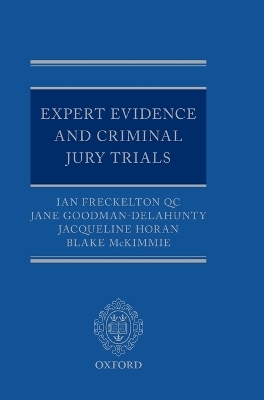
Expert Evidence and Criminal Jury Trials
Oxford University Press (Verlag)
978-0-19-874634-8 (ISBN)
With expert evidence used more and more often in criminal jury cases, evaluation of its admissibility and presentation is being increasingly thrust into the spotlight. However, jury room secrecy has long prevented a rigorous analysis of its complexities. Expert Evidence and Criminal Jury Trials draws on an unprecedented study carried out in Commonwealth jurisdictions which have recently granted access to jurors, offering a unique exploration of the presentation and comprehension of expert evidence in criminal jury trials and a critical perspective on parallel UK processes.
The authors combine empirical research conducted in the courtroom with expert academic analysis, examining, analysing, and comparing the views of not only real jurors, but also courtroom lawyers, judges, and experts across over 50 trials to gauge how complex and sometimes conflicting expert evidence is perceived and understood by all parties. Examples of modern technologies used in expert evidence, including DNA analysis and facial and body-mapping, are considered, and discussion of the challenges they pose covers not only issues of procedure and approach, but also perceptual issues and those of cognitive evaluation. This innovative study aims to facilitate a broader understanding of the use of expert evidence, what problems exist with it, and how such problems influence the communication of information to jurors.
While the survey that informs the book relates to criminal trials in three Australian jurisdictions, the legal and psychological issues explored transcend national boundaries, allowing this book to fill a gap in the market for a practical discussion of expert evidence and its use that will be relevant to practitioners in any jurisdiction which utilises an adversarial trial system or juries in criminal trials.
Professor Ian Freckelton QC is a practising Queen's Counsel and a leading Australasian scholar on expert evidence. He is also a Professorial Fellow in Law and Psychiatry at the University of Melbourne, an Adjunct Professor of Law and Forensic Medicine at Monash University, a Commissioner at the Victorian Law Reform Commission, and an elected Fellow of the Australian Academy of Law and of the Academy of Social Sciences Australia. He has published over 500 peer reviewed articles and some 40 books. Professor Jane Goodman-Delahunty is a Research Professor at Charles Sturt University in the School of Psychology and the Australian Graduate School of Policing and Security, Manly Campus. She is a Past-President of the Australian and New Zealand Association of Psychiatry, Psychology and Law as well as a Past-President of the American Psychology-Law Society. Her research is supported by the Australian Research Council, the Australian Institute of Criminology, and the United States Federal Bureau of Investigation. She has trained both as a lawyer and an experimental psychologist. Dr Jacqueline Horan is a Senior Lecturer at the Melbourne Law School and the Lead Investigator in the study which is the subject of this book. Associate Professor Blake McKimmie is a social psychologist in the School of Psychology at The University of Queensland. He is a leading jury researcher and has published in the area of social cognition and group processes, with a particular focus on jury decision-making.
APPENDIX 1: JUROR SURVEY; APPENDIX 2: JUROR INTERVIEW; APPENDIX 3: JUDGE INTERVIEW; APPENDIX 4: LAWYER INTERVIEW; APPENDIX 5: EXPERT INTERVIEW
| Erscheint lt. Verlag | 2.2.2016 |
|---|---|
| Verlagsort | Oxford |
| Sprache | englisch |
| Maße | 188 x 253 mm |
| Gewicht | 682 g |
| Themenwelt | Geisteswissenschaften ► Psychologie |
| Recht / Steuern ► EU / Internationales Recht | |
| Recht / Steuern ► Strafrecht ► Kriminologie | |
| Recht / Steuern ► Strafrecht ► Strafverfahrensrecht | |
| ISBN-10 | 0-19-874634-2 / 0198746342 |
| ISBN-13 | 978-0-19-874634-8 / 9780198746348 |
| Zustand | Neuware |
| Haben Sie eine Frage zum Produkt? |
aus dem Bereich


